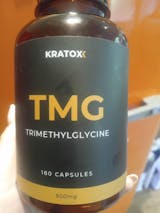Product Description
High-purity, clinically researched Trimethylglycine (TMG) — also known as Betaine Anhydrous — to support methylation, liver health, and homocysteine metabolism for cardiovascular and cellular wellbeing.
- 500 mg Trimethylglycine (TMG) per capsule
- 1000 mg total per two-capsule serving
- Supports methylation and healthy homocysteine levels
- Promotes liver detoxification and metabolic balance
- No fillers, binders, or artificial preservatives
TMG in More Detail
Trimethylglycine (TMG) is a naturally occurring compound derived from beets, renowned for its role as a methyl donor — helping to regulate homocysteine levels, support liver detoxification, and promote efficient energy metabolism. By donating methyl groups, TMG plays a critical part in DNA synthesis, neurotransmitter production, and the conversion of nutrients into usable cellular energy.
Research shows that maintaining healthy methylation pathways supports cardiovascular function, mood balance, and metabolic health.
Who Is This For?
This supplement is ideal for those seeking to support methylation, liver function, and cardiovascular health. It’s especially popular among individuals focused on longevity, energy production, detoxification, and overall metabolic optimisation.
The Ingredients
Each capsule contains 500 mg Trimethylglycine (TMG) — delivering 1000 mg per two-capsule serving. Our formula is made with 100% pure, high-quality Betaine Anhydrous and contains no fillers, binders, colours, or preservatives.
Suggested Use
Take 2 capsules daily, preferably with your first meal of the day. For best results, take consistently at the same time each day.
Premium Quality
As with all Kratox supplements, our TMG is formulated using premium-grade raw ingredients for maximum purity and effectiveness, without unnecessary additives or artificial ingredients.
100% Money Back Guarantee*
If you’re not completely satisfied with your results after 30 days or one full bottle, we’ll issue a full refund — no questions asked.
References:
Olthof, M. et al. (2003). Dietary betaine and homocysteine metabolism in healthy volunteers. American Journal of Clinical Nutrition.
Craig, S. (2004). Betaine in human nutrition. American Journal of Clinical Nutrition.
Huberman, A. (2023). “Methylation Support & Cellular Energy.” Huberman Lab Podcast.
Sinclair, D. (2024). “Methyl Donors and Longevity Pathways.” Lifespan Podcast.












